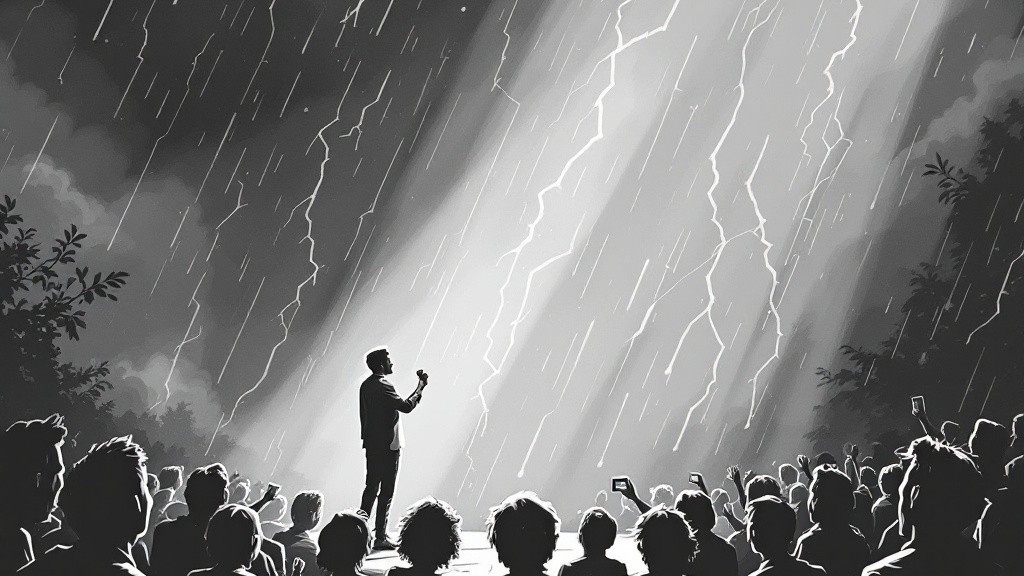Speaking Through the Storm: A Guide to Public Speaking with Chronic Illness

Speaking Through the Storm: A Guide to Public Speaking with Chronic Illness By Roi Shternin
I've always felt a magnetic pull towards public speaking, even when fear wrapped its cold fingers around my throat. The stage called to me like a siren song, yet until I was 17, I remained frozen on the shores of self-doubt. You see, while classrooms and stages felt like home - places where my true self could emerge - the crushing weight of imagined judgments kept me anchored in silence.
The turning point came when I decided to dive headfirst into speaking training. Like plunging into icy waters, that first moment took my breath away. But just like your body adapts to cold water, I found myself adjusting, growing, learning to swim in these new waters.
Fast forward several years, and public speaking became more than just a skill - it became my identity, my profession, my way of impacting the world. But here's the raw truth: navigating an international speaking career while managing a chronic illness and disability is like trying to conduct an orchestra during an earthquake. Some days, the music flows beautifully; other days, you're just trying to keep the baton from falling.
Let me take you deeper into my world of professional speaking while dancing with chronic illness - because that's exactly what it is, a dance. Sometimes graceful, sometimes stumbling, but always moving forward.
The Art of Energy Management
Honor Your Body's Rhythm: I learned this one the hard way. Those mornings when my body screams in protest? They're not being difficult - they're sending vital intelligence reports from the frontlines. I've mapped my energy patterns like a meteorologist tracks weather systems. Morning presentations? They get my peak energy. Late afternoon talks? I need a solid rest period beforehand. And those evening events? They come with a recovery cost that I factor into the next day's schedule.
Build Recovery Time: This isn't just about taking a nap after speaking (though that's often part of it). It's about understanding that recovery is part of the performance itself. For every hour on stage, I need specific downtime. Not negotiable. Not "if I can fit it in." It's as crucial as the presentation itself. I block out post-speaking recovery periods in my calendar with the same respect I give to the speaking slots themselves.
The Strategic Approach
Pre-Speaking Routine:
- 48 hours before: Start scaling back other activities
- 24 hours before: Extra rest, gentle movement only
- Day of: Quiet morning, minimal social interaction
- 2 hours before: Silent time, light stretching
- 1 hour before: Energy conservation mode
Creating Boundaries: This was perhaps the hardest lesson. Saying "no" to speaking opportunities felt like betraying my purpose. But here's the truth: every "yes" costs energy credits, and my bank account isn't unlimited. I've learned to ask myself:
- Does this align with my core message?
- Is the audience one I can uniquely serve?
- Can I deliver this without compromising my health?
- Will the format work with my energy limitations?
Technology as Your Ally
Virtual speaking has been a game-changer, allowing me to:
- Present from my optimized home setup
- Control my environment
- Eliminate travel stress
- Maintain my medical routine
- Reach global audiences without physical toll
Advanced Survival Strategies:
- Energy Banking: Store up energy before big events
- Modular Content: Pre-prepared segments for low-energy days
- Transparency Partners: Build understanding with event organizers
- Emergency Protocols: Backup plans for symptom flares
- Recovery Rituals: Post-speaking reset practices
The Hidden Gifts
Living with chronic illness while speaking professionally has blessed me with:
- Deeper authenticity in presentations
- Enhanced audience energy reading
- Greater empathy for others' challenges
- More impactful storytelling through lived experience
What I want you to know is this: your limitations aren't your weakness - they're part of your story's power. They've taught you resilience, adaptability, and wisdom that others need to hear. The stage isn't just for those with boundless energy. It's for those with boundless spirit, and that's something chronic illness can't touch.
Remember, your wellbeing must come first. The stage will always be there - make sure you're taking care of yourself so you can show up fully when you're on it.
I have bundled my experience and knowledge about public speaking in this best selling course on Udemy, Check it out.